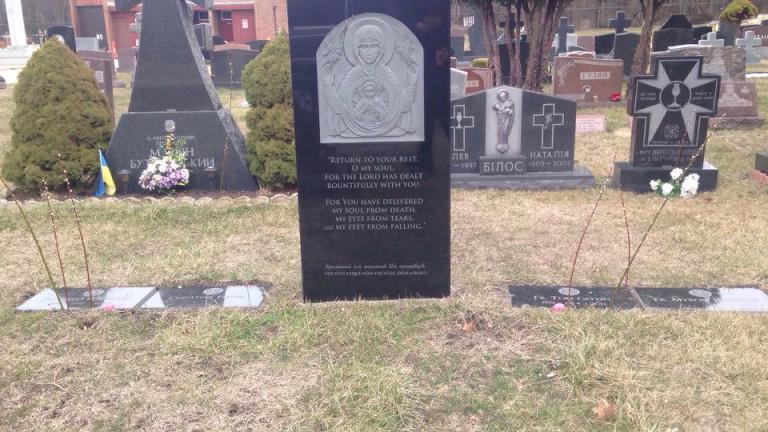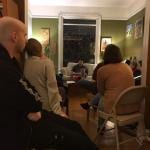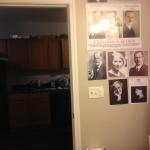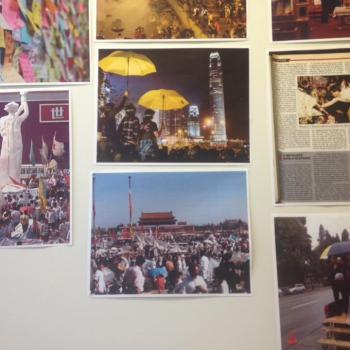
Last year at Pascha, I went with my sister and brother Summer and Julian, along with Julian’s family, to St Nicholas’s Cemetery in Chicago. As is the custom in this Kyivan Church of ours, we sang Christos voskres — Christ is risen — to those who have departed from us. We were there for Julian’s father, Fr Pavlo Hayda, who had been killed in a bicycle accident far too soon when Julian was a teenager. He is buried with Fr Tom Glynn, a priest in our church who had been in action since the mad days of the ‘Great Schism’ of Chicago Avenue, when those on the Old Calendar split with their bishop and the Cathedral who wanted to transition the church to the New Calendar. Both were fathers to Julian; from them, he got his first taste of building the church and serving the people of God.
Over where they are buried is a large stone. Inscribed on it are words attributed to the psychoanalyst Carl Jung: Vocatus atque non vocatus deus aderit. Julian’s family had had it translated also into Slavonic and put under the Latin words. ‘Called or not called god is present,’ the inscription reads, and while it is said that Jung got it from Erasmus, the words can apparently be traced back to a statement about the Oracle of Delphi in antiquity, the sentiment being that whether or not the gods are consulted or invoked, they are still present among the people as they go to war. As a theological statement, it is not exactly Christian, at least not in the exclusive sense. It’s about gods and spirits, heroes and ghosts.
As we sang Christos voskres last year, I suddenly noticed a gravestone for Fr Myron Panchuk. He was the ringleader of our little club, the Kyivan Psychoanalysis Study Group, and to my knowledge, he was not yet in the ground. Then I noticed that the stone had no dates on it. Whew, I said to him later, I thought I’d missed you dying. ‘Not yet,’ he said to me, mischievously.
He’s there now. They buried him yesterday morning. Now the three priests, united again in blessed repose, can talk about their favourite person, Carl Jung, for all eternity. Julian’s mother, who now I am sure will live until she’s like 123, says she hopes she’s deaf when they put her in with them.
As I sang Christos voskres last year in front of this inscription, it suddenly hit me that here, at this gravesite, were the origins of the Kyivan Psychoanalysis Study Group. The name had come up as a bit of a joke, a play on the original Kyivan Church Study Group which had had its origins in some part in Chicago too. That first group had been an effort by those in our church and the Ecumenical Patriarchate to study whether Greek Catholics could enjoy double communion with our mother church in Constantinople without losing our ties to Rome. Frs Pavlo, Tom, and Myron had been at least associated with that effort — it had some of its origins, I am told, at St Volodymyr and Olha’s in Ukrainian Village (on the south side of the proverbial DMZ Chicago Avenue) — but for one reason or another, all of them got into the Jungian craze of the time and started working psychoanalysis into their ministries. Fr Myron went the furthest, first getting his master’s at the Adler School of Professional Psychology, then his doctorate at Pacifica Graduate Institute. He wasn’t playing, and in a way, because he provided the intellectual engine for our group, which was otherwise just a pizza-eating and beer-drinking collective that trolled our online opponents who were deluded about both our philosophy and our importance by calling ourselves a ‘growing number’ and ‘much ballyhooed,’ we weren’t either, at least by proxy. One time I said at a meeting that, in reality, we did not exist. Fr Myron looked at me out of the side of his eye and said, That means that we exist.
Vocatus atque non vocatus deus aderit: this axiom, which could have been the theological statement of our group, also, I think, describes our analytic philosophy. As the pizza was consumed and the third of the very large bottles of Belgian beer were opened, our discussion would turn to more somber topics. So-and-so committed suicide, someone would say, and no wonder. I mean, consider his family name, what he had to live up to, and how much weight he carried on his shoulders. It was from these conversations that I became slowly educated in the sensibilities of what Fr Myron and Julian constantly referred to as anti-colonial liberation psychology, especially as it played out in the transnational social fields between Ukraine and that strange geographical entity referred to as ‘the diaspora’ where some folks become more Ukrainian than the Ukrainians in Ukraine. History in this sensibility is never in the past; it is always in the present, a conglomeration of anti-Ukrainian policy in the Russian Empire, the Holodomor genocide in Soviet times, the disaster of Chornobyl, and the movements of national liberation played out on the Maidan.
In this way, our conversations often revolved around how contradictions in everyday practice by people in our church, which was the longstanding site where anti-colonial identities were preserved, are not just about family history. The chauvinistic patriarchy often attributed to Ukrainian communities can sometimes be chalked up to the imperial colonial erasure of what Martha Bohachevsky-Chomiak calls the muscle memory of being ‘feminists despite themselves,’ that in Kyivan Rus’, families were arranged along matrilineal and matriarchal lines until these societies were destroyed by a Mongol invasion, Russian imperial annexation, Polish-Lithuanian and Austro-Hungarian expansion, and so on and so forth. Ukrainians may be known for their right-wing politics such that even those who are progressive seem easily taken in by neoconservative ideologues, but these ideological crystallizations can also be read as overcompensating for the erased memory of Cossack anarchism (and constitutional democracy, for that matter), as well as the fact that some of the earliest Ukrainian nationalists in the twentieth century were communists. The involvement of Ukrainians in white flight, gentrification, and the promotion of neoliberal political economic organization turns out often enough to be an assimilation born of trauma; as one baba in our church told me, she arrived in America in the 1950s as a ‘displaced person’ from a refugee camp and was told immediately to stop speaking Ukrainian (and German), until suddenly in the 1960s, the election of John F. Kennedy to the presidency opened up possibilities for ethnic and religious difference in an otherwise white supremacist United States.
Called or not god is present: part of the meaning of this dictum for us was that all of these contradicting structures, ancient Kyivan practice and modern imperial trauma, are part of Ukrainian experience and are broadly applicable from Ukraine and her diaspora to the problems of other colonized peoples. Submerged memories are the worst, because denying the past makes it even more real in the present. As I listened to other members of our group talk during our meetings, I confess that sometimes as an Asian American I felt out of place. I was much more used, I felt, to folks not talking about colonial trauma in the Pacific, to attempt to forget it as they move on to technological progress. But as I thought about it, the parallels were striking. As Jinah Kim writes in her recent book Postcolonial Grief, that which is forgotten tends to be only repressed. No one in Asia ever really forgot the legacies of Japanese fascist colonization, the disasters of communist experimentation, the urban elitism of Asian dictators, the longstanding European presence in resource extraction and settler genocide, and so on and so forth, and this is why it takes decades for movements of liberation and redress to emerge, whether it’s the comfort women, the 228 massacre in Taiwan, or the incarceration of the Nikkei in the Americas. It’s why Fr Myron, as part of the Ukrainian Genocide Famine Foundation, always made it a point that examining the Holodomor was part of a project of demanding justice for genocide everywhere, whether it was the Rohingya, Palestinians, Armenians, the indigenous peoples of the Americas and the Pacific, and Jews.
Liberation psychoanalysis, as I understood from our conversations, is the task of understanding how these submerged memories and ancient practices remain part of modern life, whether or not they are actually invoked. Fr Myron shows in his dissertation that this analytic strategy goes right back to Freud himself, a Jewish man with family from western Ukraine working in the urban center of the Austro-Hungarian Empire — Vienna — that had colonized his people. Freud himself was a victim of antisemitism, which is how he ended up not working in brain sciences and starting a clinic, where his patients were other Jewish people, usually from colonized western Ukraine, who had also encountered antisemitism and ended up submerging their memories too. The move from Freud to Fanon is in this sense not really a stretch; the real question is if one can get over the notion that a place in Europe can be as colonized as peoples of color in, say, Algeria (which is key to understanding Volodymyr Ishchenko’s argument that Ukraine is much better understood as a part of the Third World in terms of its history and political structure). It’s moving between liberation psychoanalysis and Jung that seems to be more of the problem; indeed, the irony is that Fr Myron had learned psychology from schools of thought from two men who ‘white-washed’ psychoanalysis, Alfred Adler and Carl Jung.
I’ll have to write another post reflecting on my own history (and baggage) with Jung, but I think here is where the axiom beneath which Frs Pavlo, Tom, and Myron are buried bursts with insight. The centerpiece of Jung’s thought, which is perhaps also one of his most controversial claims, is that there is something cosmological about our transferences. In Psychology of the Transference, Jung distinguishes between his understanding of the term and Freud’s. He says that while Freud thought of transference as simply having to do with one’s personal experience with one’s own family in terms of childhood sexuality, Jung felt that the phenomenon could be followed to reveal universal realities of cosmic motherhood and fatherhood. The theological claims here may be contestable, but the point is that our transferences are certainly experienced as gods that haunt our everyday realities. Upon reflection, that’s why Fr Myron kept on pressing me to read Jung’s memoir, Memories, Dreams, Reflections — or MDR, as he said that folks in the field called it. I’ll eventually finish it (as I will also watch Babylon Berlin, Fr Myron’s favourite thing on Netflix in recent memory), but I did discuss the first chapter with him, especially the part where Jung talks about his free associations of the words ‘Lord Jesus’ with things his father, who was a Protestant minister, said. ‘Lord Jesus’ turns out not to have any association with Christian theology in that first chapter of Jung, but its impact on him remains theological.
Called or not, these gods remain present in our lives. The task of being among a people is to realize that these invisible forces, often submerged in the psyche, play out in their actions, whether or not they are conscious of it or not. This insight undergirds the impulses of care and compassion; for Fr Myron, it meant that he could not bring himself to judge anyone, even when he might have felt personally that their actions were destructive to themselves and even the community. In fact, this sensibility lay at the crux of our disagreement when he suddenly died. I sometimes felt toward the end that Fr Myron had crossed the line from compassion into straightforward identification with the colonized, that he took on their gods when he should have known better. My discontent with his conflation was why, frankly, his death was such a shock to me. Only when we realize that the father is absent can we be free, he said to me a week before he reposed, and in this, he showed his hand, that he was much less caught in the trap of false consciousness than I thought he was. I say you are gods, but nevertheless like men, you shall die, the ancient Hebrew psalmist says, and in another place, the cry goes up to the Lord to make the nations know that they are not gods but men so that they can strike terror on the face of the earth no more. At its heart, liberation psychoanalysis is nothing short of theological discernment, of testing the spirits. Are the empires that have inflicted genocide and wreaked havoc in our communities really gods? Even if they are felt as oppressing us from above, does not this theological work reveal that they are but among us? And more importantly, does not Christian theology itself, which is a liberation from death as the ultimate oppressor, reveal at its heart that Christ is among us?
Whether or not Jesus Christ is invoked, he too is among us. But in this Messianic resurrectional liberation, the theological insight is that God does not function as a superego. He is not over us; he is with us. Together, we are a people, and as Julian Hayda recalled so eloquently when he eulogized Fr Myron at the funeral luncheon, it was Fr Myron who called us to join him in the recovery of the sensibilities of Kyivan womanism:
And at a funeral one day, as I was sitting right there, in that pew, Fr. Myron started to preach about the concept of a Divine Feminine. Unusually, he turned to me, even though the homily should have been directed toward the family of the dead person. He said, “this is probably going to offend your orthodox sensibilities, Julian, but I like to think of the Church as one, big, buxom, Black mother.” He talked about the black, fertile soil of central Ukraine, some of which he was buried with, as simultaneously life-giving, but also inviting foreign plunder. He emphasized that the Church could only nurture and feed our souls like only a woman could. He emphasized the inherent dignity—even supremacy—of women, that we must all defend. He invoked Metropolitan Andrey Sheptytsky, who, amid the Nazi invasion during WWII, commanded that every Ukrainian Greek-Catholic Church paint an icon of St. Sophia—the Holy Wisdom—above its altar. As we know through the research of Fr. Andriy Chirovsky, Metropolitan Andrey Sheptytsky believed that only Sophia’s love could inspire nonviolent opposition to Nazi atrocities, and Fr. Myron believed that our community’s strong women could resist today’s atrocities.
With such womanist convictions, we dared to call ourselves the Kyivan Psychoanalysis Study Group. The Kyivan Church Study Group revealed to us that we Greek-Catholics are actually Orthodox because our mother is Constantinople. But Fr Myron, together whether his brother priests and sister champions, showed us that we are also womanist because Christ is among us, before whom the gods that are present in our lives are judged so that the everyday lives that we live can be set free from the trauma of imperial colonization. In so doing, we become womanists despite ourselves.
Toward the end, Fr Myron refused then to be ‘the father.’ He only wanted to be a brother. Now that he is laid to rest, he too will continue among us, because the work to which he invited us is far from finished. But continuing the work will require us not to dishonour his legacy by treating him as if he were some father that we must claim. Honouring it may even force us to be critical of him at points. The point is that we are still in this together, and so are the gods, whether we have invoked them or not, and so is Christ our brother, through whom we as a colonized people pass in liberation from death to life.
Previous posts on the Kyivan Psychoanalysis Study Group include stories of our origins, as well as some of my dreams. I also was invited to eulogize Fr Myron at his funeral, and while I was not able to deliver my remarks live, I have posted them on the website of St Mary of Egypt Social Justice Fellowship, which Fr Myron had a hand in naming and of which I am a member.












